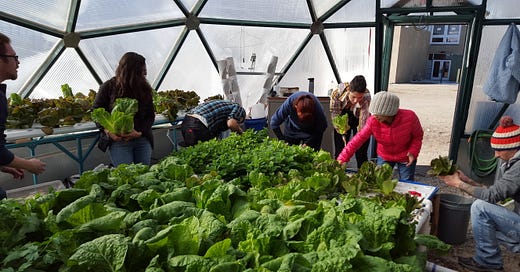The Challenge: Growing Farmers, Not Just Food
Expanding on the Roadmap to Scale Small Farms - Essay #2
This is the second essay in a series exploring the Roadmap to Scale Small Farms. If you missed the first piece on unlocking land access in DFW, you can read it [HERE]. As we move forward, it becomes clear that after land comes people. New farmers won’t just appear out of thin air. They must be trained, mentored, and connected.
We don’t just need more farms. We need more farmers.
A few years ago, I met a woman who wanted to start a farm after her daughter developed a chronic illness. She couldn’t find nutrient-dense food near her home in DFW—and when she did, she couldn’t afford it. She didn’t want to just buy better food. She wanted to grow it for others. But no land. No training. No support. She gave up.
That’s who this system is for. The people who care, who try—and who walk away because we didn’t build a path for them.
That means building a comprehensive farmer training ecosystem that covers:
Production skills (hydroponics, aquaponics, regenerative soil systems)
Business skills (accounting, marketing, sales, logistics)
Operational experience (real-world, real-time learning)
Community and mentorship (access to a professional network)
In short, farmers need not just theory, but practice. Not just content, but context. Let’s explore what that looks like.
Redefining Agricultural Training: From Workshops to Working Models
We can’t expect farmers to succeed on YouTube alone. If you think someone can learn farming from YouTube and vibes, you’re part of the problem. We need layered, modular, real-world training.
1. Tactical Workshops and Courses
For CEA systems like hydroponics and aquaponics, hands-on workshops paired with asynchronous content can deliver results. Think:
4-week online course with videos and readings
1-day hands-on practicum in a working greenhouse
For soil-based systems, modular workshops work well:
Crop planning
Irrigation design
Integrated pest management
Cover cropping
Companion planting
These could be built into a certificate program, giving farmers credibility and structure.
2. Trusted Trainers & Vetting
Instructor quality is critical. Partnerships with credible institutions (e.g., Texas A&M Agrilife) or known practitioners (e.g., BigTex Urban Farm, Marie Tedei, Becca Knutson) ensure quality.
To standardize this, we need a vetted directory of qualified workshops, hosted by a neutral third party. That builds trust and avoids bias.
3. Urban Agriculture Internships
Theory without soil under your nails is just trivia. Internships or residency-style models offer:
6-to-18-month placements on operational farms
Experience in growing, managing, and selling
Soft skills like sales, invoicing, and basic business ops
These could act as stand-alone opportunities or be built into broader programs (e.g., sweat equity toward land access).

From Classroom to Incubator: Launching Urban Farming Startups
We live in a city where you can get a margarita delivered in under 10 minutes—but if you want a local tomato, good luck.
What does that say about our priorities?
The Urban Farming Incubator
Imagine a nonprofit-run incubator:
Shared land or greenhouse space
Discounted resource access (e.g., tools, compost, seed)
Business mentorship
Operational benchmarks
Graduation when farmers reach independence
Applicants could pitch projects: e.g., growing edible flowers in a hydroponic container for chefs. Their entry could be contingent on training or business plan review. Once inside, they receive training and test their ideas in the field.
Restorative Farms in Dallas is a great example making strides here. This kind of incubation could be the bridge between interest and independence.
Building the Farmer's Safety Net: Mentorship + Network
I’ve been in this space for 15 years. I’m still learning every day—but only because I have a deep network of farmers, chefs, vendors, and advisors. New growers need that too.
But we need something more focused: a DFW Urban Ag Network that plugs new farmers into:
Peer support
Vendor relationships
Market connections
Troubleshooting help
This kind of network isn’t a nice-to-have. It’s the difference between success and burnout.
The Path Forward: From Passion to Proficiency
We can give aspiring farmers access to land. But without knowledge, mentorship, and community, they’ll struggle.
If we invest in a layered system—training, incubation, and network support—we give people a real shot. Farming can be a viable, local, meaningful profession. We must design the ecosystem for it from the beginning.
If you’ve ever complained about the food system, this is your moment to shut up and show up.
Don’t tell me you care about food and then scroll on. Don’t say you want your kids to eat better and then ignore the people trying to fix it.
This isn’t a pitch. It’s a blueprint. But blueprints are useless if no one picks up a hammer.
In the next essay, I’ll explore the third pillar: Financial Support tailored to this new generation of urban farmers.
If you have ideas, partnerships, or questions, drop them below. I’m actively building this, and I need your voice.
Let’s grow the people who will grow our food.









The sad part is that we had all this only 2 or 3 generations ago: people grew at least part of their own food, and their children learned how to do it too. Now, we have to re-learn all of it. And the world has left behind the connection so much that financing reflects a completely different model than will work for most farmers. In Canada at least, we do have Farm Credit Corporation that is specifically aimed at financing in agriculture. But I don't know their attitude towards fruit and vegetable operations, and especially greenhouse-based ones.
Sure thing. My daughter got some intro to what a garden can do before she moved out, and planted some stuff in her rental place. We are still trying to get our current garden under control (livestock took too much attention). The eventual plan is a mini permaculture orchard alongside the veggie garden.